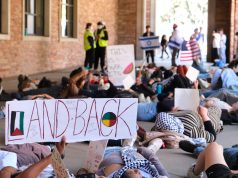and expanding teams that do outreach with Muslim communities.
In an interview last week, Napolitano outlined a
strategy against radicalization that features stepped-up intelligence
sharing with state and city law enforcement agencies as well as
increased efforts to engage American Muslims and prevent backlash
against them. And she suggested that economic hard times and the spread
of the Internet as a communications medium have contributed to the
challenges.
“We don’t want the people of
living in fear,” Napolitano said. “We are not about suggesting that the
American values placed on inclusion and diversity be at all impinged
on, in fact to the contrary.”
Napolitano’s first year leading the vast department — 230,000 employees and an array of agencies including the
Authorities have charged several Americans with
training with al-Qaida and its allies overseas and plotting attacks at
home and abroad. In addition, alleged homegrown extremists have been
accused in plots from
In a recent speech, Napolitano issued a strong
warning about “home-based terrorism.” During the interview, she said it
is hard to pinpoint reasons for the trend, but she noted that economic
hard times spur anger and disenchantment. She also cited the role of
technology in spreading a wave of English-language propaganda aimed at
aspiring American extremists.
“There’s a lot of beauty about the Internet and how
it globalizes information,” she said. “But there’s a dark side, and
part of the dark side is the use of the Internet … in materials that
feed into this terrorist type of mindset. Then connected to that is the
growth of the new media,
Although Homeland Security is often described as the department responsible for preventing terrorism in
its role in that arena has limits. The FBI has prime responsibility for
investigating suspected terrorism and gathering intelligence on
extremist groups at home.
But
has a strong presence in FBI-led joint terrorism task forces around the
nation, Napolitano pointed out. And while Homeland Security does not
gather front-line intelligence, its
Napolitano said she has already redeployed about 36 intelligence analysts from
to beef up 72 “fusion centers” created around the country during the
previous administration. She intends to send more analysts to those
centers, where federal officials work with local investigators to share
intelligence and provide training on detecting potential threats.
“One of our big initiatives now is really working
with state and local law enforcement in a closer way in terms of
sharing information … about threats and threat streams that may be
emanating from the (tribal areas of
she said. “You’ve got 800,000 law enforcement officers across the
country …You’ve got to be able to share information with them. And
it’s very hard to do that … without having any kind of a portal from
which to do it. The best one available is the fusion centers.”
A more public initiative is improving cooperation with American Muslims. Experts say the Muslim community in
remains better-integrated and more resistant to extremism than others
in the West, but its leaders have expressed concern recently about the
dangers of radicalization.
Napolitano said she is expanding “engagement teams” of the
that are in charge of improving ties between the government and Muslim
communities. Although the civil rights office still lacks a director,
Napolitano said a candidate for the crucial job has been submitted to
the
“The notion of course is to build bridges,” she
said. “It’s really making sure that communities are connected and are
not de facto isolated in such a fashion that it can breed a sense of
hopelessness, anger and poverty and other things that can lead to
somebody deciding to travel around the world and train at a camp and
come back.”
As the problem of extremism gets more public
attention, Muslim leaders worry about backlash and overreaction by law
enforcement and others with incomplete or distorted knowledge of Islam.
In
last week, CAIR called on political and religious leaders to “repudiate
recent incidents of anti-Muslim hate” such as anti-Islamic cartoons
that were posted on utility poles and allegedly disparaging statements
by a candidate for
Napolitano acknowledged that she has not had many
opportunities to meet with Muslim groups so far. But she said her work
with the Muslim community in
where she served as attorney general and governor, gave her a
first-hand look at the need to balance enforcement with protection of
civil liberties and tolerance.
She recalled a horrific case in
attacks when a gunman intent on killing Muslims ended up murdering an
Indian-American Sikh, mistaking him for a Muslim because he wore a
turban. The crime spread fear among Muslims in
“The Muslim community was saying we don’t want to
send our kids to school right now,” she recalled. “I got a sense then
of that feeling of being singled out in the wrong way. So I really
worked with the Muslim community on those issues.”
Because of the size of the
and because cases of alleged radicalization have surfaced in a number
of regions, the key to an effective response is systematic cooperation
across the country, Napolitano said.
“As we move forward you can’t just do the security of
Via McClatchy-Tribune News Service.














































